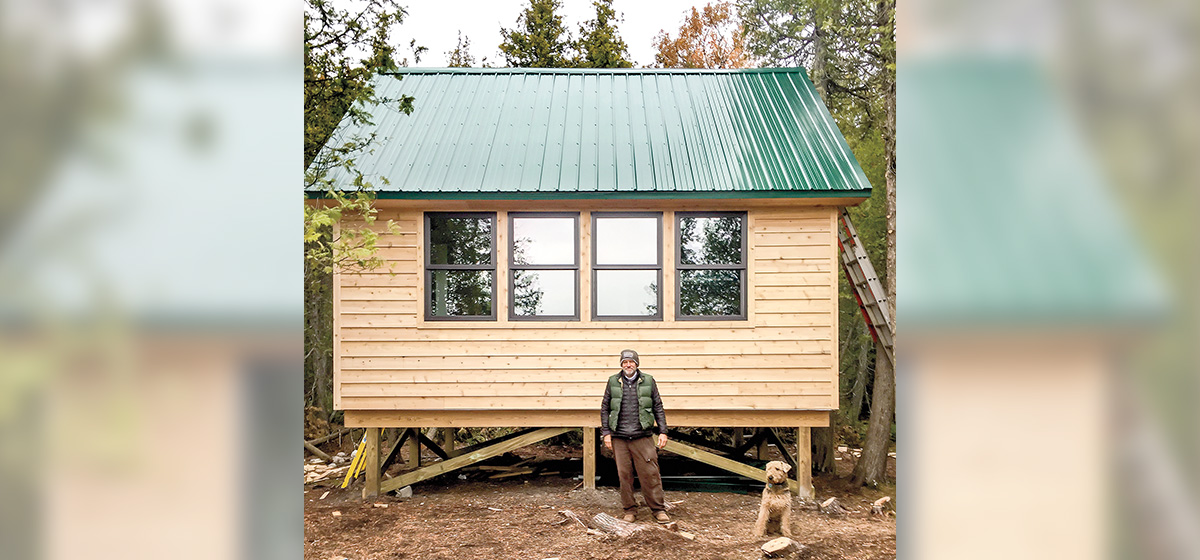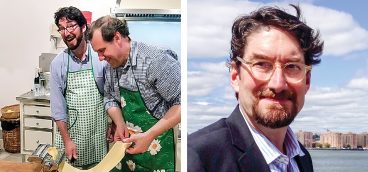
In the Fall issue, I wrote about how five friends and I escaped the hunker-down COVID malaise last summer by building a 16-by-20-foot cabin on a remote island in Michigan’s Upper Peninsula (U.P.). None of us had done it before, and by the time they left July 25, the footers, subfloor and four walls were up. Miraculously, it was all level and square, and we felt great. All that remained was for me to find a local contractor to put on the roof. I ended the story with our naming the cabin Reliance—because it relied on the efforts of many and on our belief that we could do it. It was a nice ending to a story about initiative, friendship and not letting a virus ruin our summer. The story, however, didn’t end there.
[ngg src=”galleries” ids=”381″ display=”basic_thumbnail” thumbnail_crop=”0″]At cocktail parties in the U.P. every summer, people invariably discuss the weather and Lake Huron’s water levels. But summers have their particular topics too. And in 2020, my little cabin was one. “Are you guys finished down there?” someone would ask, rattling his ice cubes. “Pretty close,” I’d answer. “I just have to get someone to come in and build the roof.”
We designed the roof to allow for a loft, and at a 45-degree angle, it would be too steep to stand on. Given that and all my friends had done, I felt more comfortable having a pro roof it. No big deal. I already had one lined up. He was supposed to come when my friends were there. He didn’t show but assured me he’d come the next week. Again, the appointed day came but he didn’t. After two more no-shows, clearly he wasn’t the man for “Reliance.” Another guy I’d met with in June had said late July would work. But I left three messages and he never called back. I called contractor after contractor, half of whom I knew. If they were too busy—they all were—I asked if they could think of anyone else. Before long, my “No” count reached 12.
The OSB (Oriented Strand Board) comprising the walls and floor was guaranteed for a month in the weather—until late August—before the glue dissolved. So when my two sons visited, we covered the walls in plastic and concocted a rudimentary roof with boards and tarps. It looked pretty good, too, until a storm blew much of it away, soaking the cabin again. With my sons gone, I precariously wrestled three 12-foot metal roofing sections up a tall ladder and flopped them onto makeshift supports. It was an improvement, but after each storm, I needed more buckets to capture the never-ending leaks. A week later, two strong young friends hoisted the rest of the roof sections aloft, and the cabin was actually waterproof for a week—until a windstorm blew the unattached steel back to the ground.
As the OSB guarantee expired, my heart got heavier with each storm. Anxiety became my companion. I recalled the fisherman in Hemingway’s “Old Man and the Sea” who caught a great marlin, only to have sharks strip it to the bone before he reached port.
One day, my wife stopped at an Amish produce stand about 25 miles north of our little town of Cedarville. She asked the proprietor if her husband did construction. He did, and she suggested I come back tomorrow and ask for Danny. Mackinac County had had very few COVID cases, but the rumor was that they were concentrated among the Amish. Still, I headed north the next day.
I pulled off the two-lane highway and into an empty dirt and gravel lot. I peeked inside a low-slung hut with an array of produce, preserves and baked goods but no people. Back outside, I surveyed the sprawling compound. A dirt drive continued between a long greenhouse with half its roof missing and a weathered two-story home. Clothes hung on a line and two barefoot little boys in straw hats watched me from under a tree. Further back, in front of a couple of barn buildings, was a mountain of birch logs, some rusted machinery, chickens, horses, and a black and white dog wagging his tail. A door opened at the house and a barefoot teenage girl in homespun and a bonnet walked over. I asked for Danny and she smiled and told me in an accent I couldn’t place that her father was with a group of men building a house.
I found Danny among a group of 20 Amish men and teenage boys in traditional garb working on a foundation. He was a fellow of medium build in his late 40s, about 5’10” with a thin, brown beard descending five inches below his chin. He walked over, took off his straw hat and wiped his brow, revealing a mop of brown hair. I introduced myself and described my situation on the island. He nodded, stroking his beard. I hadn’t shaved since May and hoped that my first real beard ever gave us something in common. He knew where Cedarville was but had never been there. He looked down with furrowed brow, deliberating, and said, “I can’t accommodate you. We have a tremendous amount of work before winter and won’t have time. I’m sorry I can’t help, because it sounds like a fun project and I’d like to see Lake Huron.”
I was about to thank him anyway but prolonged the conversation, just in case. I asked about their project and other things. It turned out he and his wife have 12 children, and their community of seven families moved to the U.P. a few years ago from Missouri. They liked the U.P. Land was cheap. But the growing season was short, and it took a lot more feed and wood to get through winter. Danny was born in Ohio, as I was. I told him my mother’s father had been raised Pennsylvania Dutch, and that the plain ways still echoed through the family. We chatted for five minutes, and as we said goodbye, he said, “If you can’t find anyone else, let me know.”
In the next two weeks, I scoured the landscape for help. It was September, and as my contractor count reached 20, my idyllic view of Cedarville darkened. Not only would no one help, many didn’t return calls. I imagined a local conspiracy—“We’ll show him—trying to do it himself.” Of course, that was ridiculous. The governor had shut down Michigan until Memorial Day, closing marinas and outlawing boats even in the virtually disease-free U.P. Then supply chain problems tripled lumber prices. Contractors were way behind and scrambling to finish projects before the unforgiving northern winter.
The specter of winter ruining my little cabin tormented me, as did my previous vow that I wouldn’t return to Pittsburgh until the roof was on. As September wore on, I imagined someone finding me in the spring thaw—like Jack Nicholson in “The Shining”—a frozen corpse grimacing in front of my ill-fated project.
Though I dislike heights, I considered roofing it myself. But after watching how-to videos, that was out, and I sheepishly updated my friends again, this time sans optimism. Time to pay Danny a final visit.
I found him and one of his sons cutting oats by hand in a field on an obscure road. I hopped the fence, waved and walked over. After a friendly hello, I told him I’d had no luck finding anyone. He said he had a lot of work ahead, including building a new school for the children. He rubbed his beard and said, “I’m going to say something which doesn’t mean I’m committing to it.” I nodded. He suggested a price if he could get three other men to come for a day. Could I pay it? I paused and said I’d pay that plus 20 percent. Why be coy? Three days later, we met again after I hailed down his buggy on the side of a two-lane highway. He’d found three guys and we had a deal. Could I pick them up to save time? He shook his head no and said, “I don’t expect you to understand this, but if we don’t pay attention to the little things, pretty soon, we won’t be paying attention to the big things. And we’ll lose our identity and way of life.”
My friends Jeb, Lee and Brad returned Sept. 10 to build the gable ends upon which the roof would rest. And a few days later, at 10 a.m., Danny, his friend, and their two teenaged sons arrived in Cedarville after a two-and-a-half-hour buggy ride. I’d arranged to keep their horses at a friend’s place for the day, and after the horses were fed and watered, the Amish crew hopped into my boat. Danny had been in a rowboat before, but for the others it was their first boat ride. “Hold onto your hats!” I called, before pushing the throttle down. Off we went, skimming across a mile of bay. The smiles on their faces said it all—this was a grand adventure.
What followed was a display of strength, work ethic and problem-solving teamwork that awed my friends and me. The youngsters climbed the walls like spiders and swung hammers like Norse Gods. The team hoisted the gable ends we’d made as if they were nothing. And the 20-foot ridge beam which had taken four of us to carry? Danny’s friend put it on his shoulder and charged up the ladder. We worked with them, expediting things with our power tools. The mood was mutual appreciation. My wife brought fried chicken and Oreos, which they enjoyed during a late lunch break—especially the Oreos. They ate on a log on the shoreline overlooking the vast blue expanse of Lake Huron—the closest thing to the ocean they’d ever seen.
On a trip back to water the horses, I asked Danny’s friend if they’d consider coming down in the future for another project. “We believe children are a gift from God,” he said. “And we don’t think it’s good for them if we’re away. Tonight, my children probably won’t see me. So we only go this far for a special circumstance and not often.” Like Danny, he was a farmer, builder and had his own produce stand. And like Danny, he had a quick wit, analytical mind and cheerful disposition.
Though they worked harder than anyone we’d ever seen, it became clear they wouldn’t finish the roof. When they stopped as darkness fell, the roof structure was built, but the green metal remained on the ground. On the boat ride back, I praised their efforts and attitude. Danny demurred, saying it wasn’t they but their religion that was praiseworthy. He thanked us all for not using any bad language, saying one reason they don’t go out in the broader world often is to shield their children from the prevalent profanity. All eight of us agreed that after the long day working together, we felt we’d made new friends.
As they fed and watered the horses in the dark, we talked about all sorts of things. Ultimately, Danny said he felt bad about not finishing. “I feel that I let you down.” To the contrary, I said, “You were the only one out of 20 people I contacted who was willing to help, and I’m grateful.” I paid him and he said to let him know if we needed him to come back and finish.
In October, I drove north amid brilliant red maples and yellow birches. I pulled into Danny’s place for probably the 10th and final time, and a couple of the children waved to me. I walked back to the barn and was looking at an enormous hog when Danny appeared and said, “Hi Doug, I figured I’d be seeing you one of these days. “ I asked about the hog, and he said that problems in the meat industry supply-chain this summer had allowed him to buy that hog for $26. It would feed his family for a long time.
We talked of many things—the troubling state of the country, COVID, religion, how he got information about the world, and the expected killing frost. “I’m always sad when the tomatoes die,” Danny said. “But their time is here. And we’ve sold a lot of them this year and eaten a lot.” I told him he could save the unripened ones by putting them in a brown paper bag with a slice of apple. Ethylene gas from the apple ripens them. “I could do that,” he said, pointing to the 100-yard-long row of tomatoes behind the barn. “But I’d need a lot of brown paper bags.” We both laughed.
Finally, I asked him if his work was done and if he might be able to return to Cedarville. “Well, I’m afraid my work won’t be done until I’m in the grave, but I can come back.” And so it was that on Oct. 14, he and his 15-year-old son Emanuel returned, working closely and with good humor from 10 a.m. until 9 p.m., long after dark, using battery-powered headlights as they finished the steep metal roof. Afterward, I paid Danny, shook his hand and thanked him before they made the long, cold ride back. He said he hoped I would stop in and say hello next summer.
On my last day, I cleaned up the residue of months of work and looked at my little cabin. If I’d known at the beginning what would be involved, I might have run screaming from the project. But now that it was all buttoned up for winter, I smiled. A long haul, yes. But now a sturdy little cabin stood here.
That night, I was the only one still on the island. It snowed and I built a fire in the old cottage my great-grandfather had commissioned in 1906. I put one of the original cedar foundation logs on the fire. I had counted the rings on that log; it started its life in 1770.
I watched the dry wood catch and crackle, considering the sweep of time. My dog Hawkins and I basked in its warmth as the snow drifted down outside. Winter was on its way, and it was time to head for home.





